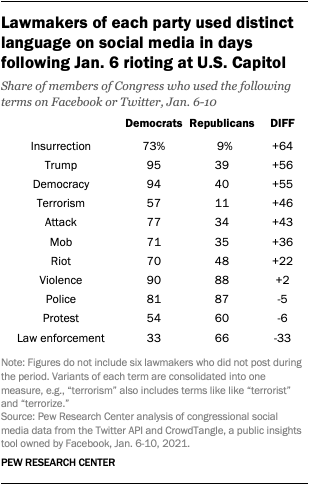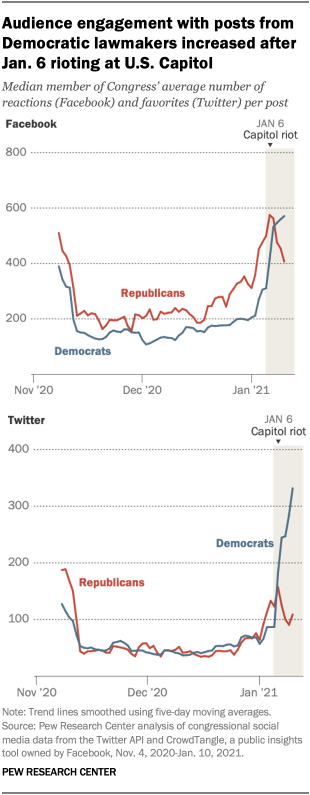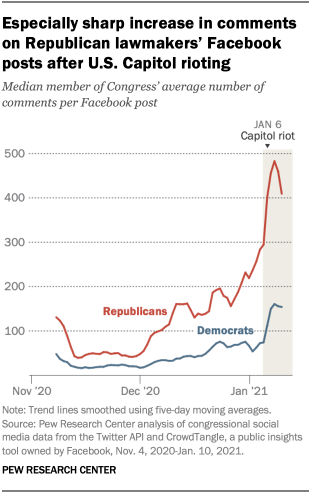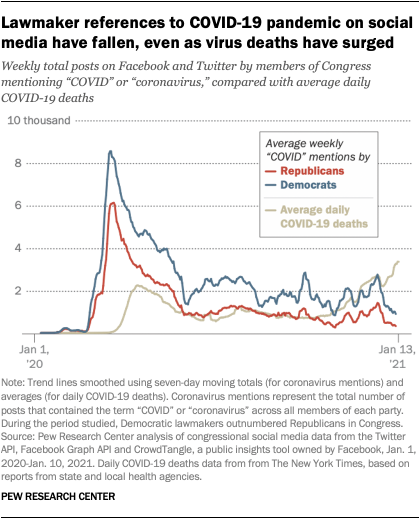Social media activity by members of Congress changed in notable ways following the Jan. 6 rioting at the U.S. Capitol by supporters of President Donald Trump, according to a new Pew Research Center analysis of lawmakers’ Facebook and Twitter posts in the days after the breach.
Below is a closer look at how members’ posts – as well as their followers’ reactions to those posts – changed between Jan. 6 and Jan. 10, 2021. The analysis is part of a larger body of research that the Center has conducted in recent years into the way members of Congress use social media. This analysis is based on public posts from lawmakers’ official, campaign and personal accounts, and includes freshman members of the 117th Congress unless otherwise noted.
Members of Congress engage in extensive communications and public outreach on social media platforms like Facebook and Twitter. To conduct this analysis, Pew Research Center collected every Facebook post and tweet created by every voting member of Congress between Jan. 1, 2015, and Jan. 10, 2021. The analysis includes official, campaign and personal accounts. Researchers also identified Parler accounts appearing to belong to members of Congress in November 2020. These accounts were found by searching for members of Congress by name, searching for accounts containing terms like “senator” and “representative,” and using Parler’s recommendation system. Here is the methodology for this post.
Members of the two parties framed the day’s events at the Capitol using different language. The vast majority of members of Congress in both parties weighed in on the events of Jan. 6 on Twitter or Facebook. All but six lawmakers posted during this period, and 97% of Democrats and 96% of Republicans who did so mentioned the term “Capitol” in at least one post. Nearly as many (90% of Democrats and 88% of Republicans) used the words “violence” or “violent.”
But beyond these basic similarities, lawmakers from the two parties discussed the events using different language. For instance, congressional Democrats were far more likely than Republicans to use terms such as “terrorism,” “insurrection,” “mob” and “democracy.” And although 95% of Democratic lawmakers mentioned the word “Trump” in at least one social media post during this time period, just 39% of congressional Republicans did so.
Audience engagement with posts from Democratic lawmakers increased on and after the day of rioting. The median Democratic member of Congress saw a substantial boost in audience engagement on both Facebook (reactions and shares) and Twitter (favorites and retweets) in the days after the violence and destruction at the Capitol. On a day-over-day basis, the increase between Jan. 5 and Jan. 6 was the second-largest ever observed among Democrats since the Center began tracking congressional social media posts in early 2015. The largest occurred on June 22, 2016, when the party staged a “no bill, no break” sit-in to demand gun control legislation.
By contrast, the typical Republican member’s audience engagement on both platforms stayed roughly the same or declined slightly (depending on the engagement measure being used) in the period after the attack, albeit from a relatively high baseline. Notably, these declines in audience engagement were largely concentrated among Republicans who objected to the certification of Democrat Joe Biden’s Electoral College victory.
The average tweet posted by the typical Republican in this group between Jan. 6 and Jan. 10 received 60% fewer favorites and 56% fewer retweets compared with the five days prior to the attack. In contrast, favorites and retweets among the minority of Republicans who voted to proceed with certification more than doubled over this same period. The same trend also occurred on Facebook, where Republicans who voted to certify saw a modest boost in engagement while those who objected experienced a decline in reactions and shares.
The number of comments and “angry” reactions in response to Republican lawmakers’ Facebook posts surged after the riot. In the days following the attempted takeover of the Capitol, the typical member of Congress received a record-breaking volume of user comments in response to their posts on Facebook. The average number of comments per post for members of both parties reached their highest levels since at least 2015. Republican lawmakers experienced an especially substantial increase in comments during this time.
Republican lawmakers also experienced a surge in “angry” reactions to their posts on Facebook. The angry emoji accounted for 17% of all reactions to the typical Republican’s average post on the day after the attack, the seventh-highest level ever observed among Republican lawmakers and the second-highest since 2017. Facebook posts from Democrats did not see a similar increase in angry reactions.
A majority of congressional Republicans lost Twitter followers in the wake of the Capitol riot. More than nine-in-ten (93%) of Republican members with at least one Twitter account experienced a net loss in Twitter followers between Jan. 6 and Jan. 10, with the median Republican losing 4% of their followers across all their accounts on the platform. These losses were more pronounced among Republicans who voted against Electoral College certification: These members lost an average of 5% of their followers, compared with 3% among Republicans who voted for certification. By contrast, 98% of Democratic members saw a net increase in followers over the same period.
These changes in congressional followers came during a period in which Twitter announced the removal of more than 70,000 accounts in an effort to curb the spread of “coordinated harmful activity” on the platform. However, it is unclear whether or not the drop in followers among Republican lawmakers can be directly attributed to the platform’s actions. Facebook follower counts for legislators in both parties remained relatively stable during this time.
As daily COVID-19 deaths reached new highs, lawmakers’ discussion of the coronavirus outbreak continued to decline. The United States recorded more than 1.2 million new COVID-19 cases and 15,000 new deaths in the five days following the Capitol riot. But on lawmakers’ social media accounts, discussion of the pandemic declined substantially. Lawmaker mentions of the terms “COVID” or “coronavirus” on Facebook and Twitter dropped to the second-lowest level since March 2020 (with the lowest point occurring in the days following the 2020 election). Indeed, the number of daily deaths from COVID-19 has recently surpassed the number of weekly mentions of the words “COVID” and “coronavirus” on social media by members of Congress.
In the months preceding the riot, a number of Republicans in Congress appear to have expanded their social media presence to Parler. The alternative social media platform Parler became inaccessible to the public on Jan. 11, when it was banned from the use of Amazon hosting services after being delisted by the Google and Apple app stores the week before. But prior to that point, a number of congressional Republicans had created accounts on the platform.
As of Nov. 30, 2020, Pew Research Center had identified as many as 138 accounts that appeared to belong to 108 Republican members of the House and Senate. Meanwhile, the Center identified 59 Republican legislators who mentioned the platform on Twitter or Facebook between September 2018 (when Parler first launched) and Jan. 10, often in an effort to encourage their followers to join them there. In contrast, just three Democratic legislators appeared to have registered accounts on the platform during the same period.
These numbers include some Parler accounts that appeared to belong to a legislator but had not yet been officially verified by the platform. However, because the site and its contents are now inaccessible it is impossible to determine the veracity of these accounts – and also impossible to determine how many other lawmakers joined the platform after Nov. 30.
CORRECTION (Jan. 25, 2021): The characterization of the historical ranking of recent levels of “angry” reactions to Republican Facebook posts was corrected to account for posts prior to 2020 that had been excluded from the original analysis. (The highest peak for this emoji occurred on May 4, 2017, when the House voted to repeal the Affordable Care Act.)
Note: Here is the methodology for this post.





